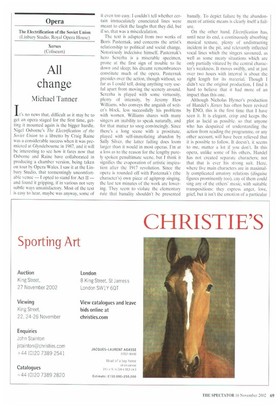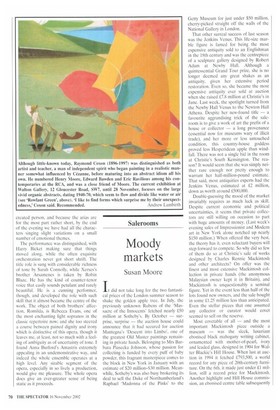Opera
The Electrification of the Soviet Union (Linbury Studio, Royal Opera House) Xerxes (Coliseum)
All change
Michael Tanner
It's no news that, difficult as it may be to get an opera staged for the first time, getting it mounted again is the bigger hurdle. Nigel Osborne's The Electnfication of the Soviet Union to a libretto by Craig Raine was a considerable success when it was premiered at Glyndebourne in 1987, and it will be interesting to see how it fares now that Osborne and Raine have collaborated in producing a chamber version, being taken on tour by Opera Wales. I saw it at the Linbury Studio, that tormentingly uncomfortable venue — I opted to stand for Act II — and found it gripping, if in various not very subtle ways unsatisfactory. Most of the text is easy to hear, maybe was anyway, some of it even too easy. I couldn't tell whether certain immaculately enunciated lines were meant to elicit the laughs that they did, but if so, that was a miscalculation.
The text is adapted from two works of Boris Pasternak. and concerns the artist's relationship to political and social change. Notoriously indecisive himself, Pasternak's hero Serezha is a miserable specimen, prone at the first sign of trouble to lie down and sleep; his dreamt remembrances constitute much of the opera. Pasternak presides over the action, though without, so far as I could tell, doing anything very useful apart from moving the scenery around. Screzha is played with some virtuosity, plenty of intensity, by Jeremy Hew Williams, who conveys the anguish of writer's block, less successfully his problems with women. Williams shares with many singers an inability to speak naturally, and for that matter to snog convincingly. Since there's a long scene with a prostitute, played with self-immolating abandon by Sally Silver, the latter failing does loom larger than it would in most operas. I'm at a loss as to the reason for the lengthy purely spoken penultimate scene, but I think it signifies the evaporation of artistic inspiration after the 1917 revolution. Since the opera is rounded off with Pasternak's (the character's) own piece of agitprop singing, the last ten minutes of the work are lowering. They seem to violate the elementary rule that banality shouldn't be presented
banally. To depict failure by the abandonment of artistic means is clearly itself a failure.
On the other hand, Electrification has, until near its end, a continuously absorbing musical texture, plenty of undistracting incident in the pit, and relevantly inflected vocal lines which the singers savoured, as well as some meaty situations which arc only partially vitiated by the central character's weakness. It moves swiftly, and at just over two hours with interval is about the right length for its material. Though I didn't see the original production, I find it hard to believe that it had more of an impact than this one.
Although Nicholas Hytner's production of Handel's Xerxes has often been revived by ENO, this is the first time that I have seen it. It is elegant, crisp and keeps the plot as lucid as possible. so that anyone who has despaired of understanding the action from reading the programme, or any other account, will have been relieved that it is possible to follow. It doesn't, it seems to me, matter a lot if you don't. In this opera, unlike some of his others, Handel has not created separate characters; not that that is ever his strong suit. Here, where five main characters are in maximally complicated amatory relations (disguise figures prominently too), any of them could sing any of the others' music, with suitable transpositions: they express anger, love, grief, but it isn't the emotion of a particular created person, and because the arias are for the most part rather short, by the end of the evening we have had all the characters singing slight variations on a small number of emotional themes.
The performance was distinguished, with Harry Bicket making sure that things moved along, while the often exquisite orchestration never got short shrift. The title role is sung with considerable richness of tone by Sarah Connolly, while Xerxes's brother Arsamenes is taken by Robin Blaze. He has the kind of counter-tenor voice that easily sounds petulant and rarely beautiful. He is a cunning performer, though, and developed the role with such skill that it almost became the centre of the work. The object of both brothers' affection. Romilda, is Rebecca Evans, one of the most enchanting light sopranos in the classic repertoire now; and she too steered a course between pained dignity and irony which is distinctive of this opera, though it leaves me, at least, not so much with a feeling of ambiguity as of uncertainty of tone. I found Anna Burford's Amastris extremely appealing in an undemonstrative way, and indeed the whole ensemble operates at a high level. Any sizable segment of the opera, especially in so lively a production, would give me pleasure. The whole opera does give an ever-greater sense of being static as it proceeds.



























































































 Previous page
Previous page